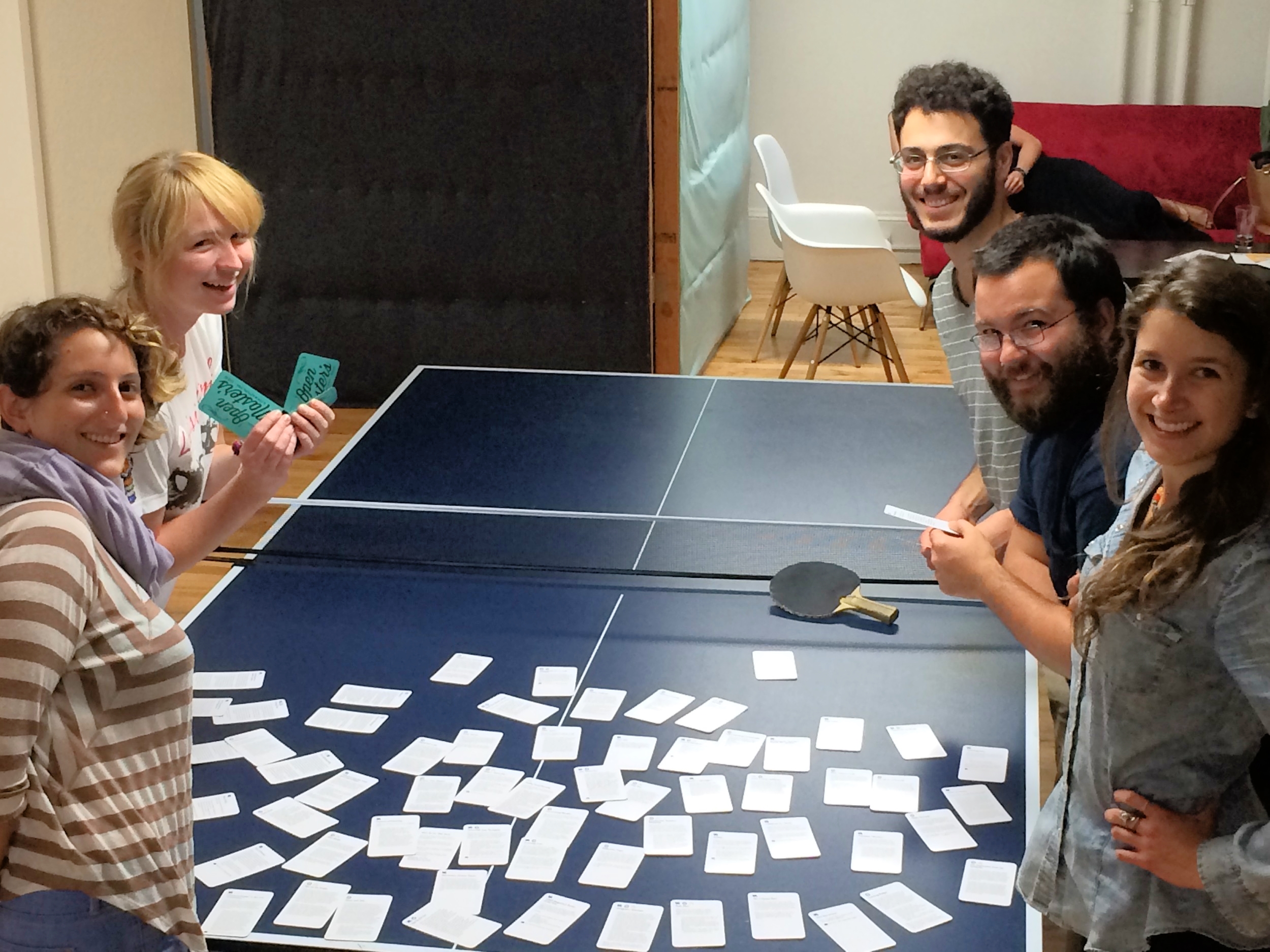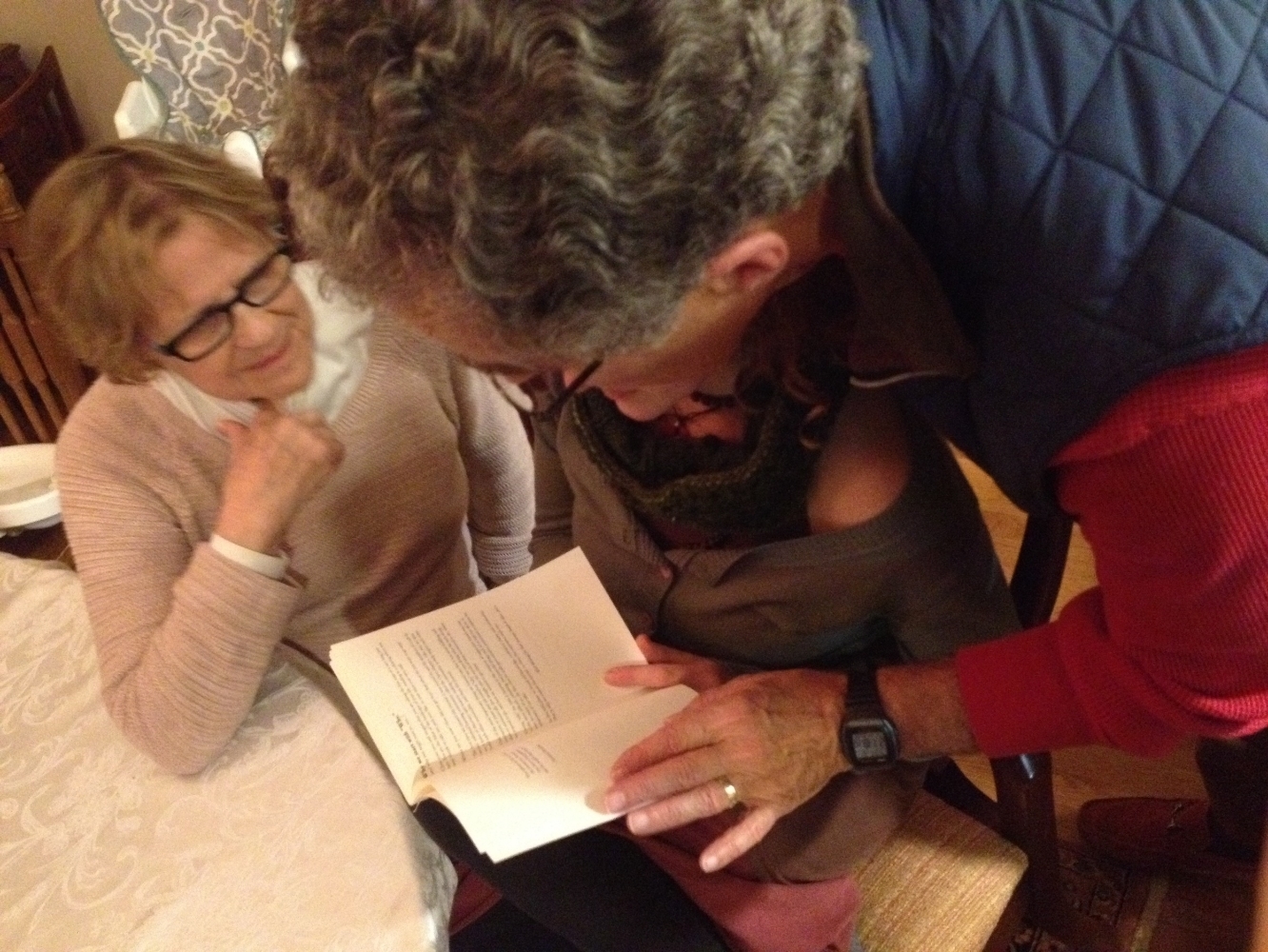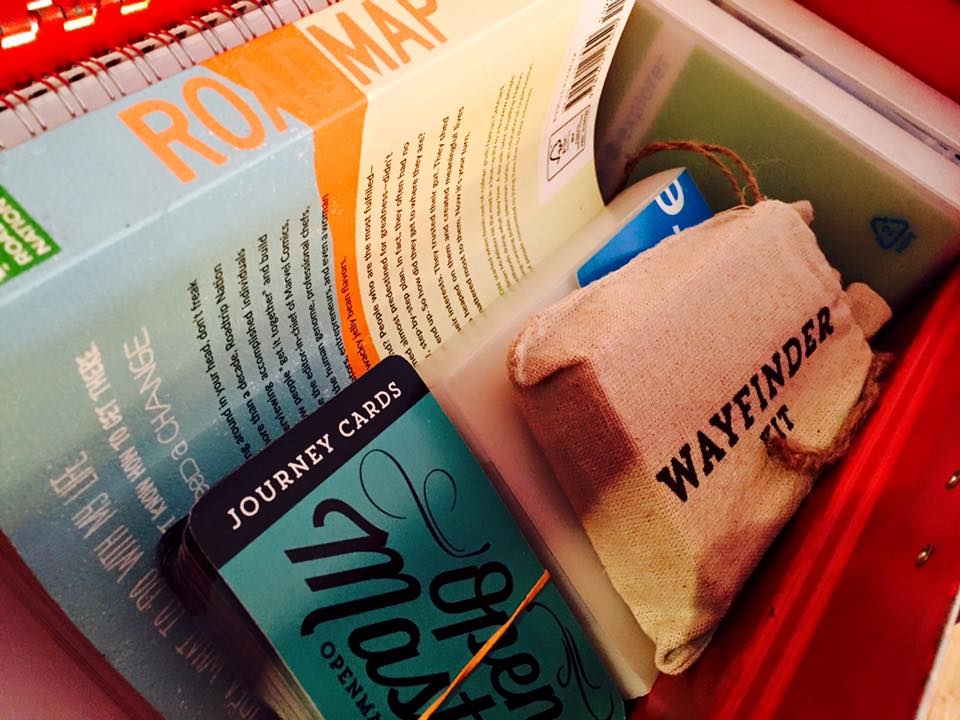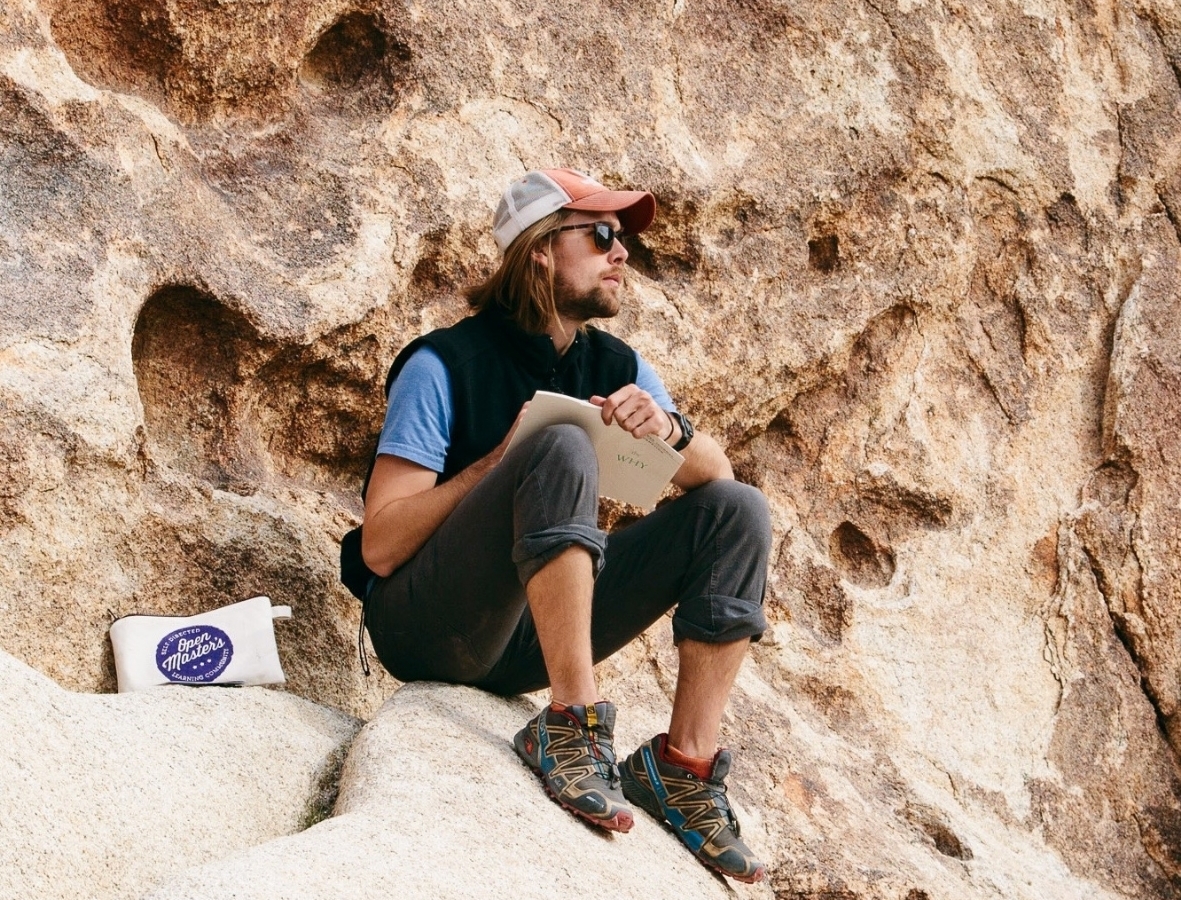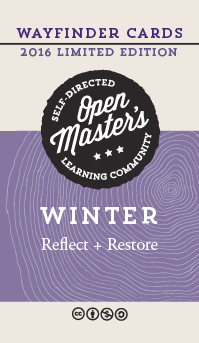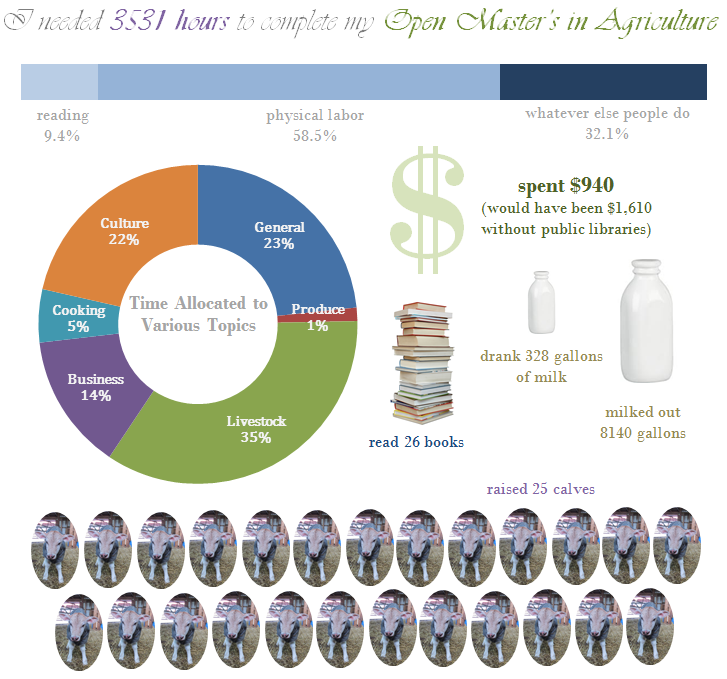“Your mission in life is to find the intersection between your heart’s deep gladness and the world’s deep hunger.”
It’s not a real master’s degree. It’s better.
The journey that the Open Master's helps us navigate is a universal quest, a line of query that touches the soul: understanding what you want to do (really who you hope to become), how and why you want to do it, and who you want to do it with—and then doing it.
Your Open Master's journey will be designed by yourself but hopefully shared with a small, intimate group of peers.
Self-Guided Journey + Peer Community
Every Open Master's journey is unique, but there are some similar steps or "seasons" you can expect on the road ahead. The Open Master's is merely a container, a method, and a loose global community to help you hold it all together—but it's a bold one that comes alive in ways you could never imagine until you claim it and start to make it your own.
Generally, the process looks like:
- Committing to a period of real pause for deeper inner reflection, followed by;
- Crafting and sharing a learning plan that you can use to organize yourself and invite others to be part of your Open Master's journey with you, and, finally;
- Celebrating the milestones you reach.
Your journey may be based on any topic or question that makes you come alive, and can take many different forms. You will use it to tie together the many aspects of what you want to do or how you want to learn—reading, courses, volunteering, travel, service, research projects, sabbaticals, apprenticeships, mentoring relationships, and more.
Yes, you can just decide to do this.
You can launch your own Open Master's whenever you are ready. You don't need permission from anyone (least of which us) to get started.
You can, however, get everything you need to begin to design your own Open Master's in the Wayfinder Kit, which our community designed to guide you through this moment (and is also, transparently, one of the few ways this community generates income to stick around and support folks like you).
We highly recommend sharing the journey with a few friends. Find more below about other forms of support.
First, here is a glimpse into the journey itself and what you can expect...
Finding Your Why: Begin with Radical Pause
Every Open Master's journey begins with slowing down.
We all face decision points and wonder what would be the best way to clarify and move forward on our goals. Is it going to grad school? Switching careers? Traveling? Most importantly, how do we make wise choices about what's next that are grounded in who we are?
The Open Master's journey is journey of becoming, of bringing together the questions "what I want to learn" with "who am I becoming." How do you arrive at the kind of knowing that kind of journey requires? It requires doing something a bit counter-cultural and radical in most of the world today, slowing down, and pressing pause in a big way.
So, when you start your Open Master's, our first recommendation is to give yourself a rare full season of reflection on the path you've been on and might walk from here. Before you even begin, set a date by which you won't make any kind of decisions.
Instead of making decisions, make time to ask yourself the questions that really matter to let you reconnect with your why, or just to let all of the life you've already lived catch up with you.
This season of pause isn't just about rest, it's also about letting perspective, wisdom, and a grounded sense of direction find you again, to better align your short-term learning goals with your long-term hopes and dreams.
Read more about radical pause on the On Being blog.
Some inspiration for exploring your why:
Next, the How: Ready to Go?
While the beginning of your Open Master's is slower and more reflective, you are building insight, energy, and focus for launching into the plans that you have been creating. In transitioning into "the How," we start to translate our powerful why into plans we can carry out. We invite a community of support to join us on the journey. We build new structures and rhythms for holding ourselves accountable.
Anchors
One of the ways that we build structure into our learning plans and tie them into the daily reality and rhythm of our lives is to build "anchors" for important learning goals and long-term dreams. These are the totems that keep us tethered when the unique challenges of self-directed learning arise.
- A clear, compelling why: a mission, purpose, mantra to guide you. Put it right up front.
- Key relationships attached directly to learning goals or themes.
- A sacred place: a desk, a corner, a secret spot in a park, that is dedicated to your learning.
- A regular time, rhythm, or routine in your week. This could mean a full day dedicated to your study and practice, or regular daily habits and rituals, like creative writing in the mornings, or Shabbat shared with a partner every Friday.
- A project or seasonal theme: something with a clear beginning and end.
- Milestones: working backwards from big goals.
- Visions of success: what does mastery, perhaps in 10 years, look like?
Seasons
You don’t have to do it all at once. Almost everyone imagines their Open Master's plan in seasons that progress and build on each other over time. Some are slower and reflective and match the energy of Winter. Some are planning and "planting" oriented and mirror the energy of Spring. Some are action, adventure, and motion oriented and resemble the energy of Summer. And some are oriented around reaping the benefits, looking back, and celebrating your learning—maybe making art or other expressions of your learning—and resemble the energy of Autumn.
You might consider designing your learning plan according to some seasons ahead in your life, either the literal ones, or self-designated chapters with different kinds of energy.
Picking a Focus for Now
The final step is giving yourself realistic short-term goals and assignments for just the first season.
Whether you already have a list of themed seasons for your Open Master’s journey, start by putting detailed designs around one project or one goal for the first part.
Given how we're conditioned to think about learning, our notions of a "project" or "goal" can be pretty limited. If you're struggling to land on what your first season might be about, here are some ideas.
- Healing. Make a plan that focuses almost 100% of your energy on the work of healing. Perhaps this means going on an "ancestral journey" to the places where your family is from, or maybe it means bringing attention and care to your body.
- Self as Subject. Exploring toxic masculinity in the world? Dedicate a season to finding and working on the manifestations of your theme in yourself. Make yourself the subject before others.
- Exploration. (“Experimental Phase”, “Prototype Phase”) Make this a season for testing ideas in small, practical ways. This can help you get started, without necessarily having to decide everything about your learning plan. Design a series of small experiments rather than a big, ambitious project. If you want to write more, simply plan a solitary writing sprint in a cabin for a weekend. If you want to explore your Hindu roots, make a weekly coffee date with an elder, or place a sacred text on your bedside table. Just dip your toes in.
- Service. Dedicate a season to showing up in service of others—other projects, other learners, other members of your community, even local inspirations and heroes. Let learning goals emerge from those challenges, conversations, or observations.
Here are some examples of what Open Master's plans might look like!
Celebrating Milestones: More than "Graduation"
An Open Master's journey invites you to think creatively about what "graduation" might look like.
In our community, we often talk about ways of "harvesting, sharing, and celebrating" your learning instead of "graduating."
For most of us this will happen at a few milestones along the way, not just one grand finale. However, it is helpful to articulate a particular milestone or two you have in mind when you begin your Open Master's. Some of our favorite questions for defining these at the outset include:
- When will you know when you've accomplished whatever drew you to begin your Open Master's in the first place? What signs, internal or external, or validation, might you receive when you're doing what you set out to do or becoming the person you set out to become? Will you:
- Be invited to give a speech or write a book in your domain of expertise?
- Publish the findings of the research you have completed?
- Open your art gallery?
- Be qualified (and feel that you are ready) for a dream job or role (or to make your own)?
- Feel a grounded, inner confidence in the skills and mastery you set out to develop?
- At what point in your journey might you be considered a 'peer' of someone you admire—someone you think of as a "master" or hero in your chosen domain(s)?
When you arrive at an important milestone, here are some possible ways to mark the moment, inspired by others in the Open Master's:
- Publish a story, summary, or portfolio of work completed in your Open Master's.
- Host a dinner celebration for all the people who helped make your Open Master's journey possible. Tell the stories of your journey, show your best work, pay it forward, and give a preview to the new things that are now growing in your life as a result of your hard work.
- Transition into another adventure. Perhaps it's the beginning of a new role, the evolution of your learning into a more formal context, or a much-needed sabbatical. Read about Axle's Sabbatical in SE Asia.
- Create a gift. Without someone assigning papers, it can be hard to motivate yourself to summarize your own learning, even if the act of reflection is a valuable part of the learning process. One way to focus your harvesting energy is to think of a gift you could create from all of the learning you have done that could benefit another person or community you care about.
- You will find dozens of other ideas in the Wayfinder Cards.
In reality, no one is ever "finished" being a learner. By the time most people have completed their Open Master's, it simply evolves into a new chapter and they keep on learning!
Ready to Get Started?
Get the Tools
Over the last six years, the organizers of various Open Master's community have created the Wayfinder Kit to help you get started.
People in the Open Master's community all began just like you. Please get in touch with us at cocreate@openmasters.org; both to hear your story and cheer you on as you cross milestones.
Organize a Community
Do you want to get an Open Master's community going? Have an interest in facilitation and co-creating learning community with others?
Reach out to us about ways we can work with you to get started! And stay tuned for more organized learning communities launching periodically around the world.
Want Personal Support Getting Started?
Wherever you are at in your learning journey, we offer one-on-one support for your next steps on it.
Experienced members of our community offer support throughout the seasons of your learning journey, building your learning community, finding mentors, designing and publishing learning plans, building structures, rhythms, and habits of accountability for yourself, harvesting and sharing your learning to your community, and more.
Rates for personal learning guides are a sliding scale monthly retainer fee, by mutual agreement after our first conversation and according to your needs and ability to pay.
If you're interested in exploring a relationship with one of us, fill out the short form below. We'll follow up within a week to schedule a free discovery session about whether this is right for you.






